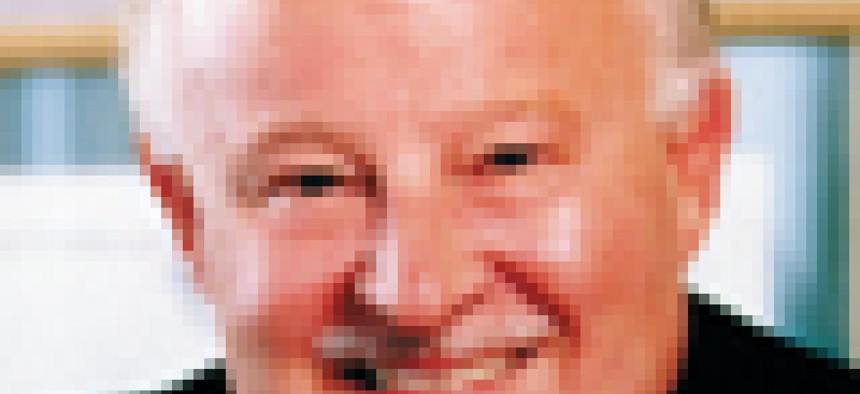CACI Management Switch Signals New Focus

Brushing aside criticism about executive turnover, CACI International Inc.'s chairman and chief executive pointed to the company's record revenue and new president as evidence it is on the right track to becoming a top-tier government contractor.
By Nick Wakeman, Staff WriterBrushing aside criticism about executive turnover, CACI International Inc.'s chairman and chief executive pointed to the company's record revenue and new president as evidence it is on the right track to becoming a top-tier government contractor.CACI posted record revenue for its fiscal year 1999 of $441.7 million, a 35 percent increase over the $326.1 million in 1998. Net income increased 21 percent to $14.2 million, compared to $11.7 million in 1998. CACI's annual financial results were released Aug. 12, the same day the company announced a major management change. Kenneth Johnson was named president of CACI's federal, state and local government business. Johnson is a former president of Cordant Inc. (now part of GEC Marconi) and most recently a senior consultant at Federal Sources Inc. of McLean, Va. Johnson is the de facto replacement for chief operating officer Ronald Ross, who is leaving the Arlington, Va., company after two years. Acquisitions, especially the November 1998 addition of QuesTech Inc. of Falls Church, Va., accounted for most of CACI's growth, but internal growth was still strong at 11 percent. QuesTech strengthened CACI's information assurance and intelligence capabilities. CACI also acquired Information Decision Systems in 1998 and Government Systems Inc. in 1997.CACI Chairman and Chief Executive Officer J.P. "Jack" London said in an interview that Johnson was brought on board to evolve the centralized business development capabilities the company needs to pursue large enterprisewide contracts. Without criticizing Ross, London said CACI is not moving fast enough to build the internal structure needed to pursue large procurements. "I want that to be the third leg of our growth profile," London said. The other growth drivers, he said, are acquisitions and sales through the General Services Administration schedule and indefinite delivery, indefinite quantity contracts.Ross told Washington Technology that he began planning his departure in the spring when it became clear that he was not going to be considered for the chief executive post, which is held by London. When he was hired two years ago from Computer Sciences Corp., Ross said, it was with the understanding that he would be in the running for the chief executive spot if certain performance criteria were met. "I felt the performance was there," Ross said. Some analysts that track the company expressed concern about Ross' relatively short stint and chief financial officer Jim Allen's exit from CACI less than a year ago."It is never particularly good when a COO leaves," said Michael Coady, an analyst with Sidoti & Co. of New York.William Loomis, an analyst with Legg Mason Inc. of Baltimore, called Ross' departure "disconcerting." But from an overall standpoint, he said, "there is a good [management] team in place. CACI is still bigger than one or two posts." London defended his company's turnover record, saying it was no higher than that of other companies. And he said seven of 10 senior managers have been with CACI for more than 15 years. With Johnson on board, London said, CACI will be able to pursue more business like the Air Force Distributed Mission Training contract, a $342 million, five-year effort to build a simulation and training system that allows air crews to train in simulation from geographically separate locations. CACI, Computer Sciences Corp., Science Applications International Corp. and TRW Inc. each have won a $1.1 million contract for the first phase of that project.A final winner for that Air Force project should be picked in the next year. While the contract has a five-year base, it could last 15 years and be worth more than $500 million.Pursuing these types of contracts will push CACI into another league, analysts said. "They'll be coming up against bigger competitors," Coady said.At its current run rate, CACI should top $500 million in 2000, London said. The company's business mix is 49 percent Defense Department, 30 percent federal civilian agencies, 16 percent commercial and 5 percent state and local.Loomis said CACI could become a $1 billion company in a few years. "They have a substantial capacity to make acquisitions, and they have strong internal growth," he said. Driving the company's internal growth are sales through the General Services Administration schedule and indefinite delivery, indefinite quantity contracts, according to London. But acquisitions also will play an important role in the company's growth, he said, noting that CACI has three deals in the works and is looking at companies in the $50 million to $100 million range. Such companies have capabilities in areas such as communications, intelligence, and electronic commerce.CACI's future as an acquisition target continues to pop up. Alan Parsow, who owns a 5 percent stake in CACI, is making moves to get on its board to try to force a sale. London confirmed during a recent teleconference on financial results that CACI has been approached by at least one company, Anteon Corp. of Fairfax, whose overture was rejected by the board. London would not comment on specifics of Anteon's proposal. Although the company is not seeking a buyer, London said the board seriously reviews acquisition proposals.


Jack London
NEXT STORY: Data Stream

